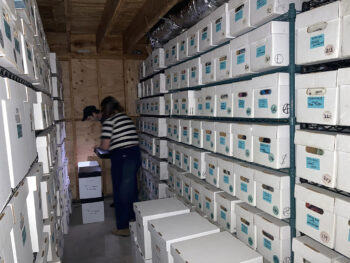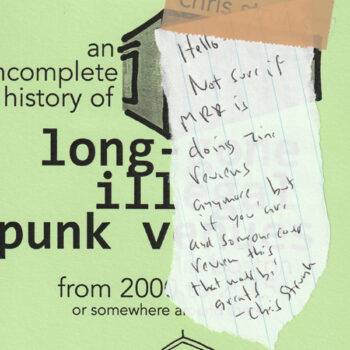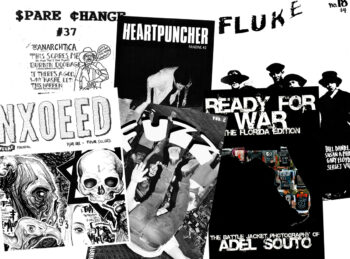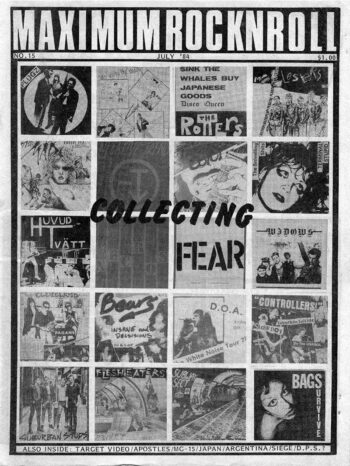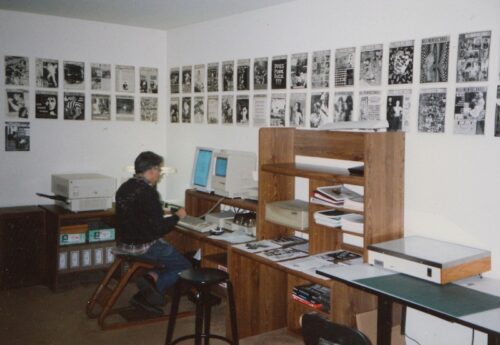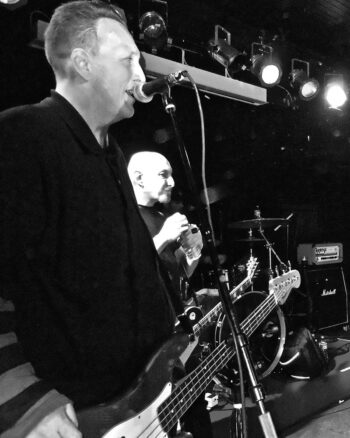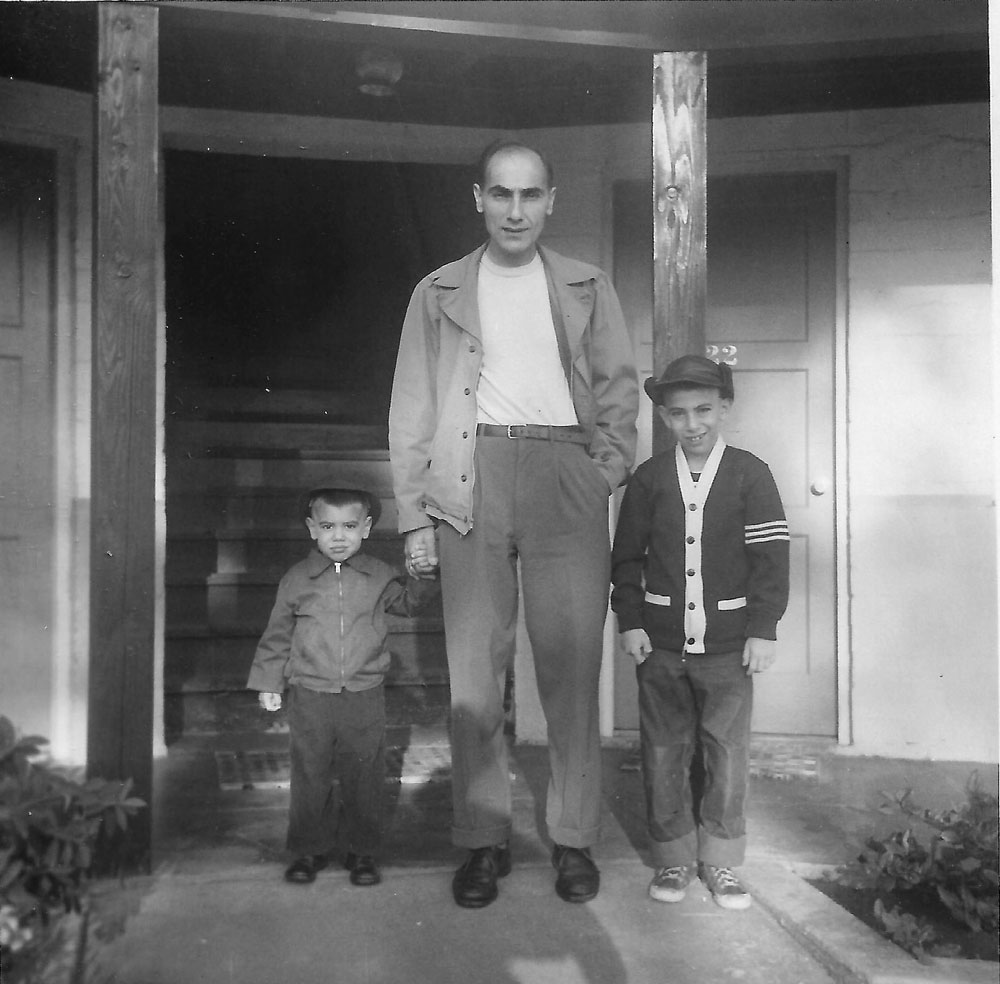”Too smart for their own sake”:
Toronto’s ACTUAL WATER

By George Lastman
How smart is too smart? How funny is too funny? For Actual Water, the answers to these questions are not mutually exclusive. To them, being Toronto’s resident “musically inclined intellectuals” (their words, not mine) goes hand in hand with being jokers of the scene. It seems natural to Actual Water that their lyrics, hefty in theme and resplendent in undergrad-informed verbosity, ride simple, guitar-driven tracks that simply rock. Still, there remains a sort of roundabout danger and uniqueness to the boys, as they prefer to do things like conduct interviews in very un-rock situations, e.g., in a public library.
Anthony Nemet, 24, enters the room in a brown blazer and well-fitting jeans. Sitting gracefully in the largest chair in the building, he crosses his legs and squints at a copy of Extraordinary Popular Delusions and the Madness of Crowds by Charles Mackay. A 19th century text exploring phenomena as wide-ranging as economic bubbles and alchemy, the text is both sensational and academic at once, almost as useful as it is thrilling and accessible. Watching the lead singer and Rickenbacker-swinger of one of Toronto’s most inscrutable rock bands read such a heavy tome could be disorienting, but Nemet is quick to clear up any questions about what he’s into what he’s into.
“This is a key text when trying to understand the psychosis people feel when confronted by rock n’ roll,” Anthony says, looking down his nose at me. “Let’s be honest, what is a rock show if not an expression of mass hysteria?” He pauses, laughs, and looks over at Gary Pooni, 24, his friend and partner in songcraft. Clutching a copy of Malcolm Gladwell’s The Tipping Point, Pooni concurs with a nod, a smile and shrug of the shoulders, his body language suggesting that Nemet go on. The room goes silent as the two return to their books.

It’s not easy to interview Actual Water. They often go off on tangents, talk over each other and speak in big words that rarely, if ever, make much sense. Pooni seems especially eager to confound anyone within earshot with his verbal dexterity. As drummer, percussionist and lyricist of the group, Pooni clearly wishes to loom large among other “intelligent drummers who write songs” like Neil Peart and Traffic’s Jim Capaldi. Speaking in measured sentences punctuated by rapid-fire invective as well as frequent use of alliteration and free-associative metaphor, Pooni speaks as if he is constantly trying to remind you of how smart he is. Rather than reading as a symptom of insecurity, it seems to be more of a giant joke that is always on the verge of going over my head. Still, when he needs to make a point, he does so with brevity.
“Look, the point is to make a record that makes you think and doesn’t stink.” He says as he leans forward, looking me dead in the eye and taking on a conspiratorial air. “All these other bands, most of them anyway, all they’re interested in is having a good time, shooting the shit and leaving the heavy intellectual work to the next guy. The next guy, of course, is a chimp who doesn’t want to do anything but play asinine riffs through a Big Muff.” His face goes grim for a moment before a smile cracks and he glances over at Nemet who also can’t help but laugh. Right as I feel like I’m starting to get the joke, however, Pooni flips the script. “I mince garlic,” he says, “not words. I hate to say it, but rock bands nowadays are just getting dumber”.
At times, Actual Water’s façade breaks down and you see them for what they are: two kids from Toronto who love making controversial statements about the politics of rock almost as much as they love the music itself. Their songs, acting as an outlet for this aggression against bands (no specific names mentioned) that they deride as being “chimps, chumps, chicken and not fit to chauffer an Actual Water roadie to Coachella”, often read as rock ‘n’ roll think pieces, both in form and content. They’re also fond of using terms like “entry-level” to place groups in a hierarchical structure that places Actual Water at the top, as if they have been appointed (or anointed) CEOs of modern guitar music. The end result of this barrage of invective is that the band appears holier-than-thou and narcissistic. Still, when you see them crack up, you begin to wonder if they actually believe any of what they’re saying.
Name-calling and bullshit politics aside, the group’s latest album, Call 4 Fun, is exactly what its name implies. “It’s a fun record. It’s like the best alcohol rock party you’ve ever been to at Foucault’s mansion,” says Nemet as he leans back, closing his book and placing a gold bookmark between its worn pages. “The idea of calling for fun’ is putting the onus on both the listener and the band. You better know what numbers to dial.” Indeed, the title track is a thrilling stab at joyous guitar pop that isn’t far removed from early 2000s garage rock. Later in the record, on the beautifully dark dirge of “Waldo Jackson,” a reference is made to the titular character “falling out of his tree onto a stack of old NMEs”. When asked to connect the dots, Pooni and Nemet smile. Relishing the opportunity to talk about two of his favourite things at once, Pooni explains that Waldo Jackson is a “tired, whiney old indie guy who lives in the 90s and can’t get it up long enough to stop thinking about guitar tones and start having a good time.” Fair play.
There they are: rock politics. They creep up once again, as they often do with Actual Water, but almost always with humour. True to their status as jokers who love a good conceptual gag, the difficult inside jokes keep coming. They accumulate in front of me, piled high like paperwork in a language I don’t understand and can’t make any sense of. As it becomes more and more difficult to tell when they’re taking me for a ride, their music becomes more and more revealing. Still, when they really need to make a point, they make sure you know they’re serious. Actual Water’s mission is inject excitement into rock by any means necessary, even if that means doing decidedly un-rock things, like reading Gladwell in a library on a weekend. They want nothing more than to bring a pulse back to a genre that’s been lagging since Julian Casablancas started singing falsetto.
Of course, when I make this Strokes reference to the group, they go serious. Nemet insists that his falsetto is “the most beautiful sound you’ll ever hear.” Pooni adds that listeners “cannot yet afford to hear him sing in his nightingale register.” I try to read their body language to see if they’re joking and feel as if I’m floating aimlessly in the middle of a Chomsky text without an intellectual paddle. They’ve done it to me again, and they’ll do it to you as soon as you play Call 4 Fun. I’ve gotten used to it, and I don’t regret it. Neither will you, trust me.

